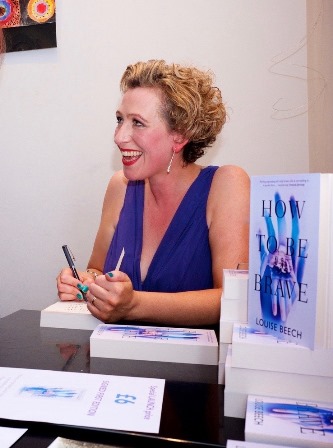Louise Beech discusses the musicality of writing, and why you don't necessarily need to know the technical parts to know how to write.

I always listen to music when I write. There are certain albums in my collection that remind me of short stories or novels I wrote while playing them. Listening to these songs now has me right back in the place I was when creating those stories – on the sea, in an eerie house, in the dark. While writing this, I’m listening to Lana Del Rey, so I’ll find my way to the words.
There’s something about music’s rhythm, the synchronicity of background melody and beat, and of course the lyrics, that inspires me immensely. Always has, ever since I heard my father playing the guitar and saw his sheet music covered in curious symbols and scribbles. I didn’t understand what they meant but I knew they led somehow to his harmonious tune, drifting up the stairs.
Are printed musical notes not very much like the language we use when writing? These symbols represent the duration and pitch of a sound. In sheet music they are put together in such a way so as to create a symphony. And though I do not understand the specifics of writing music, having only read about octaves and timbre and psychoacoustics, the result is something I absolutely understand. The result speaks to me. Sings to me.
And so it is with fiction. I’ve often struggled with the specific term for a literary device; I was overjoyed, for example, to realise that the word cadence is a term for the momentary changes in rhythm and pitch, for setting the pace of a piece. I didn’t know the word for this ‘thing’ at first but I instinctively knew how to do it; I’m learning as I go. The act of writing is how I learn. I consider my words in a similar way to how a musician might consider the notes..Is alliteration not musical? Are words that rhyme, words that repeat, words that get mixed up not melodic? Are long meandering sentences mixed with short snappy ones not tempo?
Understanding sheet music requires a special form of literacy, like learning French or sign language. However an ability to read or write it is not essential in creating music. Many composers have been capable of producing music without the capacity themselves to do so. My son is a self-taught musician. Clearly inherited from my father, he is a natural. He can pick up a guitar and play - no guide, no big words. It’s all about ear: as with writing. Voice is not something that can be taught (or perhaps even labelled with a term more than simply voice?) but it’s what we find, instinctively, on the journey.
I can’t understand sheet music and am often embarrassed when other writers talk about particular devices, having never heard the word previously, but I’m in a safe and magical place when I sit down and just write. There, I may not know how to describe what it is that I’m doing, but I can do it.
I read once that notes separated by an octave (the break between one musical pitch and another) ‘ring’ together, adding a pleasing sound to music. When writing How to be Brave many octaves separated themes that I wanted to ‘ring’ together as the story progressed. It was all about the spaces between – the perfect interval. So when a candle was used in a pivotal scene at the end of my novel, the previous times it had been used meant it burned all the more brightly at the climax.
Some music writers say the melody comes to them first - perhaps heard in the clatter of footsteps on tiles or in birdsong - and some say it’s the words. For me, writing stories is very similar. I often sense the rhythm of a story before the actual plot follows. I’ll wake from a dream with a curious ‘feel’ for a story. My short piece, Learning to Breathe, was inspired by a dream of a child drowning in the bath. I created a story about a girl escaping a violent home life by swimming away with dolphins, during bath time. The musical undercurrent involved much repetition of phrases, growing in urgency, and a mimicking of the sounds dolphins make.
My debut novel How to be Brave has been described as having a lyrical quality. There could be no greater compliment. The strong maritime theme gave me much to work with - what greater music than in the ebb and flow of the sea? I’ve found that water trickles so regularly into my work. Another discovered term on this journey is motif, which is a recurring subject, especially in a literary (or musical) work. Isn’t it a wonderful word?
But, as well as the instinctive music of divine inspiration, I really also have to thank Lana De Rey, Beethoven and Sam Smith for the lyricism of my debut novel on this occasion…
Comments